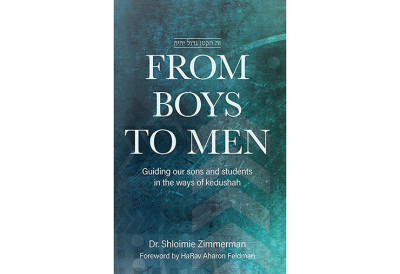
Rabbi Dovid Lichtenstein: Dr. Shlomie Zimmerman is a student of Chofetz Chaim. He is a licensed psychologist. He has written a book called “From Boys to Men,” with approbations from Reb Aaron Feldman, Reb Elya Brudny and others. Welcome!
Dr. Shlomie Zimmerman: Thank you.
DL: This is an unusual book. Can you share the gist of it?
SZ: The book is split into 2 parts. The 1st half is conversation points for parents to have with children about topics of holiness, what happens physically when they develop, marital intimacy, health, and safety. The 2nd portion is how to navigate puberty and the struggles that are inevitable when it comes to issues of holiness. It also deals with general outlook, development, parenting, and how to deal when kids fall and have setbacks and how to know when to seek professional guidance.
DL: Why is this book relevant now than in previous generations?
SZ: The value-add of this book is that it really seeks to empower the parents to educate their boys on these matters because they are the closest people to their children, and they can target these lessons to their children at the most age and developmentally appropriate point in life. The 2nd half of the book deals with what to do when the bochurim struggle- there is a lot of stuff out there that really wasn’t so clinically sound and potentially not so hashkafically sound. The organization “Guard Your Eyes” and I felt that there was a tremendous need for such a book. We see thousands and thousands of bochurim struggling at all levels with this. Most importantly, this is one of the few things, if people get the right education and get emboldened to show up and be there for their children, we can prevent so much unnecessary pain and suffering if we do this right.
DL: What did you experience that instigated you to write this book?
SZ: Some of the things that were out there on how to intervene when bochurim were struggling I found to be very problematic. I found there was a huge absence just in clarity both in terms of a hashkafa perspective and a psychological perspective of what the healthy approach to dealing with this is and what can we really do to guide parents and rabbanim who are in the frontlines in dealing with these issues. “Guard Your Eyes” and I decided to therefore undertake this enormous project and I checked in with Gedolim to make sure this is appropriate. With the intense involvement of Gedolim, we worked on this for years.
DL: Give us examples of approaches that you saw were wrong and sought to address in your book.
SZ: The most problematic things were when people were learning very intense seforim on these matters with the bochurim, talking negatively, making them feel intense regret and shame. One of the biggest issues we see psychologically is something called pathological shame, where a person feels that he is totally unworthy, a fraud, and not a real ben torah. We saw an enormous amount of this approach that led to pathological shame. In the worst cases, we saw people who meant well trying to intervene and get them to stop but were actually feeding into the problem. Even people who were using positive approaches were very busy with this, making special sedarim on this issue and programs where bochurim were encouraged to talk about their successes. These approaches would single this issue out, making it unique and different than any other topic that bochurim have to deal with, whether it be bittul Torah, loshan harah, or chillul hashem. This issue became an outside thing that was given greater weight. And this issue in particular, the more you are involved with this, the more busy you are with it. The gedolim in the last 50 years, across the spectrum, have stated the main thing is hesech hadat (taking your mind off it), to not be busy with this and not feel horribly and even if you are struggling to be able to move on. I thought that was an essential piece that we needed to give people: to understand the interventions that they were trying could actually inadvertently make it worse because you are making them more busy and creating more negative feelings, which can actually fuel more acting out behavior. Our goal was to give parents tools so that they don’t fall into that trap.
DL: So shaming and being obsessive are examples of misguided and dangerous approaches. What else did you want to try to emphasize to parents in your book?
SZ: I want to emphasize that even a positive approach could be a major problem if this becomes the focus. The gedolim’s perspective was to make you forget about this, and when you struggle you struggle, but you redirect yourself into positivity. Positivity in learning, hobbies, friends, a healthy social life and exercise. We need to give them the sense that this is not what their life is about. Life is much broader, and this is a difficult struggle that everybody experiences to one degree or another. We need to help them realize that their thoughts and drives are normal and that they are totally worthy.
This article is based on Shiur 408 (2/18/23)- “Looking out for Shemiras Einayim,'' from a podcast called Headlines, hosted by Rabbi Dovid Lichtenstein.
Looking Out For Shemirat Einayim
Typography
- Smaller Small Medium Big Bigger
- Default Helvetica Segoe Georgia Times
- Reading Mode


